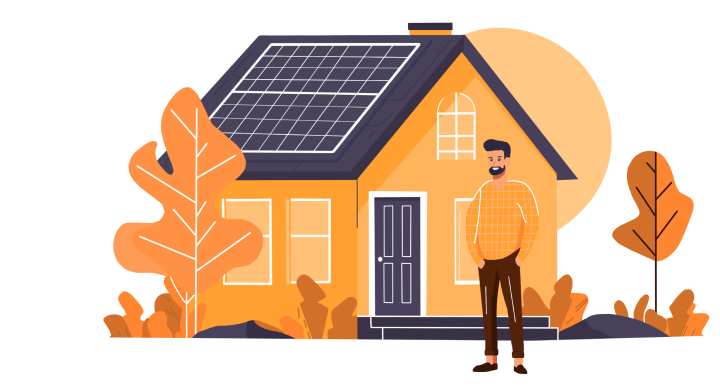Is it time to install solar power at home? It's a smart move for both your finances and the environment in the long run. A solar power setup can significantly reduce your electricity bills by letting you generate your own energy, leading to long-term savings that outweigh the initial costs.
At Solar Energy Host, we simplify the switch by connecting you with top local providers. Just enter some basic information, review competitive quotes and find the best offer to start saving today.
Residential solar power at home reduces electricity bills and carbon emissions.
Once you install solar power at home, you generate your own electricity, drastically cutting down on what you owe each month in utilities. Over the years, these savings can add up to thousands of dollars, making the initial investment in solar installation more than worthwhile.
Additionally, it helps lower carbon emissions, contributing to a positive environmental impact.
Every kilowatt of solar energy you generate is a step towards a greener future because you're reducing your home's reliance on fossil fuels and cutting down on carbon dioxide and other harmful greenhouse gasses. On the other hand, traditional power sources, like coal and natural gas, produce significant emissions that have a negative impact on the environment.
Solar power gives homeowners energy independence.
When you install solar power at home, you don't have to worry as much about the fluctuations in energy prices set by utility companies. If you install panels, you shield yourself from these future price hikes, allowing you to stabilize your energy expenses.
The peace of mind that comes with knowing you have a reliable and self-sufficient power source can't be overstated. During blackouts, having a system with a battery that's been installed by one of the reliable solar installation companies means you can still power essential household devices. This capability is particularly invaluable if you live in areas prone to frequent power outages.
Solar power installations can increase property value.
When you install solar power at home, you not only save money while living in the home but also gain more when you decide to sell it. It's an investment that keeps on giving.
More homebuyers today prioritize energy efficiency and sustainability. Homes equipped with solar power often attract a premium because they promise lower utility bills and a reduced environmental impact. Considering the growing demand for green homes, the presence of solar panels can be a deciding factor, making your property stand out.
Comparing the upfront costs vs. financial benefits
Solar installation costs can vary, but homeowners have financing options.
Depending on whether you opt for a small or large system when you install solar power at home, your cost of solar panel installation can differ. Labor rates, permit costs and the amount of sunlight your home receives, which are all dependent on your locale, also factor into the final expense.
Be sure to explore the payment options or repayment plans available from your chosen provider. Financing options such as solar loans, leases and power purchase agreements can help make the investment more achievable for homeowners. They allow households to start benefiting from solar energy and its savings more immediately.
Many homeowners recover their initial investment over time.
While the upfront cost of solar panels can seem steep in the short run, one of the benefits of solar power is that homeowners can enjoy long-term energy savings. The return-of-investment period for solar panel systems varies, but many homeowners recoup their investment within a few years.
Monthly utility bills often decrease considerably once you install solar power at home, as homemade solar energy reduces reliance on the grid. Over the years, these savings add up to a substantial amount, offsetting the initial expenses of solar installation services.
Moreover, some on-grid solar systems generate excess energy, which can be sold back to the utility company for additional earnings, a process known as net metering. These financial benefits translate to a robust long-term return.
There are tax credits, incentives and rebates from the states and federal governments that help offset upfront installation costs.
Governments and local agencies often provide financial aid to encourage the adoption of renewable energy sources. Federal tax credits can cover a significant portion of your installation costs, while state incentives can further reduce out-of-pocket expenses. Additionally, rebates from local utility companies can offer immediate savings post-installation.
How the installation works
When you first schedule your solar PV panel installation, a professional will inspect your roof's condition to ensure it's suitable for supporting solar panels. They will calculate how much energy your home needs to determine the size and number of panels required. Then, permits are secured from local authorities before technicians install the solar panels according to the approved design and specifications.
Once the solar panels are up, a final inspection is conducted to ensure the installed system is safe and adheres to all local codes. Most of these steps will be handled by your provider; don't hesitate to ask which steps are included in your quote.
The length of the installation process varies depending on panel size and type.
A few weeks are typically required to complete the entire process, accounting for the planning, permits, and inspections involved in preparing your premises for installation.
Installing solar panels typically takes one to three days, depending on the size of the system and the complexity of your roof or installation surface. Variables like the roof angle, structural modifications, and wiring complexities can also impact the timeline.
Solar Energy Host can connect you with the top local providers that have the expertise suited for your preferences and needs.
Frequently Asked Questions (FAQ)
What factors affect the efficiency of solar panels?
Things like the angle and orientation of the panels, how much direct sunlight they receive, and any shading from nearby trees or buildings can all play a role in your solar panel efficiency.
Even the type of home solar panels you choose and the local temperature can make a difference. Proper positioning and regular assessments are essential to ensuring you're getting the most out of your investment.
What are the common maintenance requirements for solar panels?
What's great about solar panels is that they require minimal maintenance. Regular cleaning to remove dust and debris, routine inspections for potential damage, and checks to ensure all electrical components are working correctly are typically all that's needed.
How do I choose a reliable solar panel installer?
Finding a reliable installer involves comparing quotes and services from different providers. Instead of searching for "solar installers near me," stick with us at Solar Energy Host. We simplify your switch to renewable energy by connecting you with trusted local providers. Just share some basic details, and we'll send competitive quotes from top-rated professionals directly to you.
Harness the power of the sun with Solar Energy Host
At Solar Energy Host, our friendly platform allows you to easily compare solar energy installation options, so you can make well-informed decisions without doing all the legwork yourself. With us, arranging to install solar power at home is easy.
Reduce your electricity bills and support a sustainable future for your family. See how much it will cost to install solar panels for your home today!














